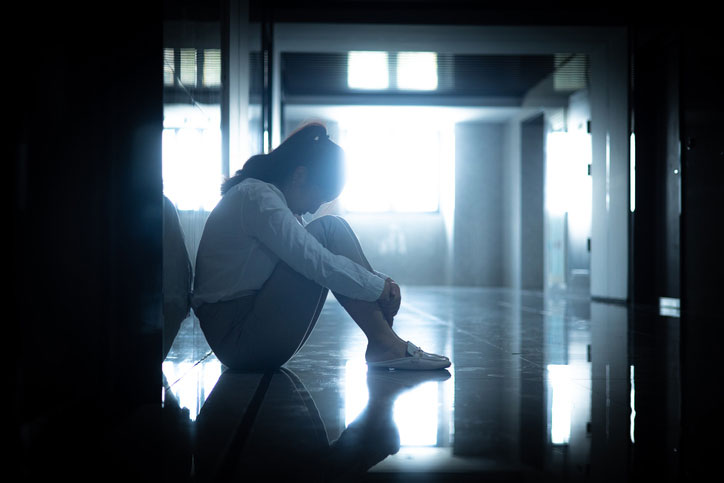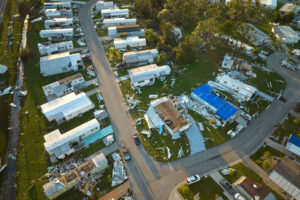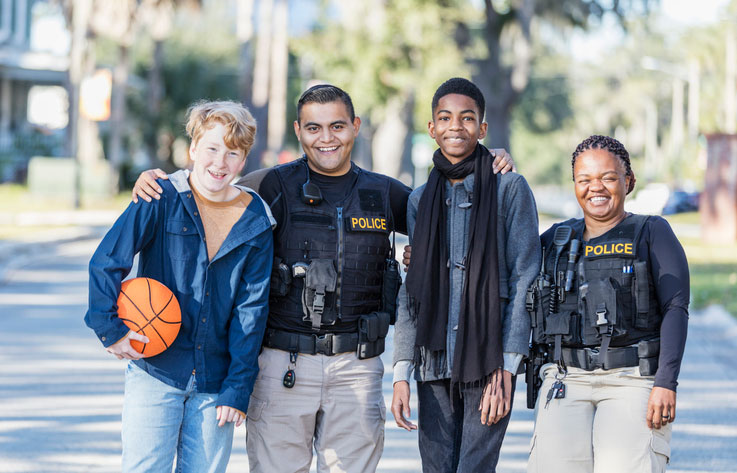Written by Sam Medley

Between July 2023 and June 2024, almost 120,000 Floridians underwent involuntary mental health evaluations due to one of the state’s most unique and most hotly-debated laws: the Baker Act.
For a person to be “Bakerized,” they must be suspected of having a mental illness and pose an immediate threat to themselves or others. Family members, mental health professionals, physicians, and judges can all invoke the Baker Act, initiating a mental health intervention with someone experiencing crisis even without their voluntary compliance.
Proponents of the law say it’s an invaluable backstop to intervene and protect people suffering from mental health crises. Critics say that a forced intervention itself is often too traumatizing to be helpful and doesn’t provide long-term support to people or their loved ones beyond the crisis episode.
But the one thing that everyone agrees on is that in a moment of crisis, you want talented social workers on the scene.
If you’re gearing up for a career in social work in Florida, and want to specialize in crisis intervention, you’ll find plenty of opportunities to hone those skills to perfection and put them to use in a way that can save lives.
What Is Crisis Intervention? — Understanding One of Social Work’s Most Central Skills

You can certainly specialize in helping people through crises, but crisis intervention is more than a social work speciality. It’s one of the fundamental skills central to the field of social work. In any type of frontline micro-level social work, you’ll have occasion to use crisis intervention techniques — whether working for the Florida Department of Children and Families (DCF), or a small privately run community-based agency.
While crisis intervention calls for quick, adaptable decision-making, social workers rely on a structured approach that involves:
- Quickly assessing the client and the situation
- Instilling a sense of safety in the client and building trust
- Providing counseling and therapy as needed
- Utilizing immediately-available resources like mental health professionals, emergency response services, food banks, and anything else that might help clients in the short-term
- Planning long-term support strategies with other agencies, their colleagues, and members of the client’s support network
Throughout this process, validating a person’s feelings and acknowledging their fears are crucial steps. And as that person’s pillar of support in the here and now, it’s equally important to impress upon them that the crisis will pass and they will get through it.
You Can Begin Developing the Crisis Intervention Skills You Need for a Social Work Career in Florida with a BSW
Because crisis intervention is one of the field’s most fundamental skills, virtually all Bachelor of Social Work (BSW) programs in the state cover basic intervention practices. You don’t need to look for a BSW with a specialty focus, though you may find some schools offering a certificate or minor in crisis intervention that you can earn alongside your bachelor’s.
Even as early as your BSW practicum you could begin getting real world experience in crisis intervention by taking on a generalist social worker role at an agency that serves at-risk people. This includes agencies that specialize in:
- Mental Health and Substance Use Disorders
- Child Welfare and Domestic Violence
- Forensic Social Work, Serving Crime Victims and the Incarcerated Population
- Serving the Indigent and Unhoused
- Military Social Work, Particularly those Severing Veterans Suffering from PTSD
Hurricane Season: When All Social Workers in Florida Become Crisis Intervention Specialists
 In just the last three years, 16 weather-related disasters (most of them either severe storms or cyclones) have killed about 300 people, displaced countless more, and caused over $100 billion in damages. Many communities and the people who call them home are still putting their lives back together.
In just the last three years, 16 weather-related disasters (most of them either severe storms or cyclones) have killed about 300 people, displaced countless more, and caused over $100 billion in damages. Many communities and the people who call them home are still putting their lives back together.
But in those moments, Florida’s social service network shows how strong it really is.
Following Hurricane Ian, one of the deadliest cyclones to hit the Gulf Coast since Katrina in 2004, DCF crisis counselors provided more than 100,000 services for Floridians left in the storm’s wake. They helped people access food benefits, find emergency shelter, and process the fear, anger, and sorrow that comes with losing your home and loved ones.
However, the DCF isn’t alone in their quest. Community-based charities, hospitals, nonprofit organizations, and social workers of every stripe played a part in that monumental effort. Some traveled from other parts of the state to help those in Ian’s path. And when the time comes, they’ll do it again, too.
An MSW with a Focus in Clinical Practice is Key To Taking On Advanced Intervention and Counseling Roles in Florida

Similar to BSW programs, many MSW programs in Florida will cover crisis intervention techniques. But unlike BSW programs, an MSW can offer a clinical focus with classes covering advanced therapeutic and interview techniques — both of which are invaluable during moments of crisis.
Clinical MSW programs focus on mental health. More specifically, they prepare students to provide advanced therapeutic interventions like cognitive behavioral therapy and to diagnose mental health disorders like depression, anxiety, and PTSD.
Just as importantly, earning an MSW accredited by the Council on Social Work Education (CSWE) with a specialty focus in clinical social work is key to becoming a Licensed Clinical Social Worker (LCSW) through the Florida Board of Clinical Social Work, Marriage & Family Therapy and Mental Health Counseling.
Due to their reliance on in-depth mental health training, you’ll find that many crisis intervention roles call for MSW-prepared LCSWs.
MSW Specializations to Become an Adaptable Crisis Interventionist, at the Micro- and Mezzo-Levels
Plenty of universities in Florida offer related MSW specializations that can also help you advance in crisis intervention social work, both in clinical practice and outside of it.
MSW Programs in Trauma-informed Practice
By specializing in trauma-informed social work practice, you can learn how trauma, whether it’s recent or not, affects people and how to help them process it. The curriculum for these types of MSW programs is often similar to that of clinical programs and can also help you prepare for LCSW licensure.
Dual Degree Options that Combine an MSW with a Master’s in Law, Public Health, and Other Areas
Outside of clinical practice are MSW degrees with concentrations that can prepare you for Certified Master Social Worker (CMSW) licensure through the Florida Board of Clinical Social Work, Marriage & Family Therapy and Mental Health Counseling.
The CMSW credential is required for high level generalist practice, including work that might intersect with the Family Court in Florida. And for the most ambitious social workers, an MSW duel degree track that combines a master’s in law (LL.M.), Master of Public Health (MPH), Master of Public Administration (MPA), or other graduate degree provides the best preparation.
Crisis intervention social workers with the additional layer of expertise that comes with a dual master’s are a force to be reckoned with. Knowing the ins-and-outs of the family court system can help you help others navigate it. And while public health specialists typically take on community education roles, they’re also instrumental to helping people in the wake of large-scale disasters.
Some of the Most Important Work in Crisis Intervention is Reserved for Florida’s MSW-Prepared Social Workers
Once licensed, you’ll qualify for crisis intervention jobs that include:
- Crisis Clinician: a clinical social worker who assesses, diagnoses, and coordinates care for people in crisis at mental health and substance use disorder treatment facilities.
- Mobile Response Team Clinician or Supervisor: a high-level member of an MRT who often spearheads intervention efforts and handles complex situations.
- Child Crisis Social Worker: a specialized child welfare worker who often handles cases involving abuse and severe neglect.
Outside of these specific roles, you’ll find other advanced positions under titles like crisis specialist, crisis interventionist, or crisis support specialist. Like entry-level roles, they can be found at mental health facilities and other agencies that serve at-risk people.
Florida is home to two unique career opportunities that put you firmly in crisis specialist territory.
Crisis Response Specialist / Police Social Worker

In this role, social workers embedded with local police departments assist officers in de-escalating situations and connecting people to emergency mental health resources.
In Florida, employing police social workers is a relatively new trend. Miramar PD near Miami was the first department in the state to take on a social worker in December 2023. But with the Pinellas County Sheriff’s Department and Orlando PD advertising for similar roles in mid 2024, it seems to be catching on.
Some police social worker roles require an MSW and licensure while others only require a BSW. It’s generally up to the local government and department to decide.
Mobile Response Specialist
The DCF and their partners operate more than 50 Mobile Response Teams (MRTs) that provide mental health crisis services to people all over Florida. While some of the higher-up roles require a Master of Social Work, MRTs employ social service professionals to create safety plans, coordinate long-term support, and perform other supportive duties.
Certification and Training Programs Can Help You Hone Your Skills
If you want to learn more about crisis intervention (or want to show potential employers that you’re an expert), there are plenty of professional certification and training programs that can help you do just that.
Even if you’ve already learned crisis intervention practices through a BSW or MSW program, the field’s always evolving — training and certifications help you keep up-to-date.
Fortunately, Florida has a great intervention training resource in FL LEADS, an organization that offers free suicide prevention training to the general public, social service professionals, and medical practitioners. While they have quite a few online training courses, social workers may want to check out their classes on:
- Question, Persuade, Refer (QPR): an evidence-based class on crisis intervention for clinical and non-clinical professionals.
- Safety Planning: a class on developing a collaborative safety toolkit for people in crisis.
- Dialectical Behavioral Therapy (DBT): a class on an advanced therapeutic technique for licensed mental health professionals like LCSWs.
You can also earn certifications from national advocacy groups like the American Academy of Experts in Traumatic Stress which offers multiple certifications in serving people who’ve gone through trauma and suffer from PTSD. Likewise, the American Institute of Health Care Professionals offers a crisis intervention counseling certification for nurses, counselors, and social workers.
Plus, if you become a certified or licensed social worker in Florida, you’ll need to earn continuing education credits to maintain your license. Crisis intervention training and certifications can help you meet that requirement while learning new life-saving skills.
Where To Find Crisis Intervention Specialist Jobs in Florida
Once again, the best place to find crisis intervention specialist jobs in Florida is any agency that serves at-risk populations: mental health facilities, houseless outreach agencies, the DCF’s MRT program, etc.
However, there are a few major players in the state’s crisis support network that might be a good place to start your job hunt:
- The Florida Behavioral Health Association (FBHA). As a professional organization, the FBHA doesn’t employ crisis interventionists themselves, but they frequently post jobs for crisis specialists at behavioral health facilities across the state.
- The Mental Health Association of Central Florida. This nonprofit provides mental health services to children, families, and individuals all over central Florida. You may also be able to find jobs through some of their local county partners.
- The National Alliance on Mental Illness (NAMI) Florida. NAMI is one of the nation’s leading mental health advocacy organizations and has affiliates in most Florida counties. Their partners and sponsors include local advocacy organizations, healthcare systems, and other potential employers.
Keep in mind, though, that your options aren’t limited to serving people suffering from mental health crises. Social service agencies across the state serve people fleeing domestic abuse, fighting substance use disorders, and many other dire circumstances. With the right training and experience, you can be right there with them.
